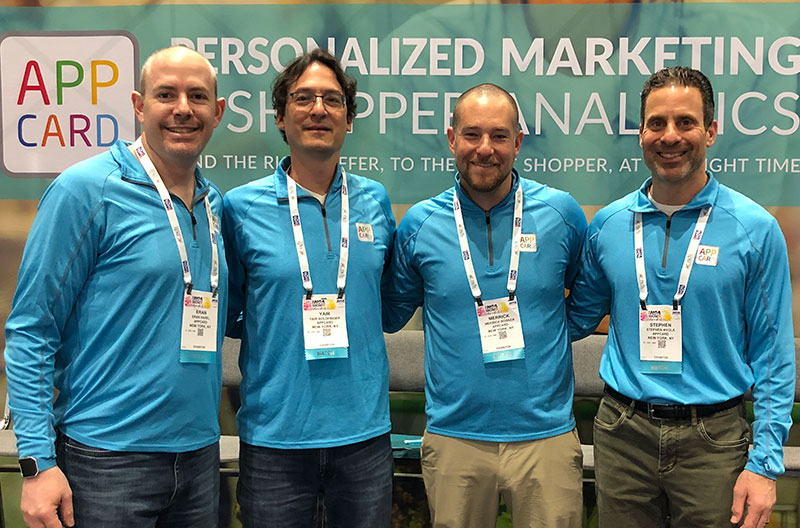by Terrie Ellerbee/editor-Southwest
AppCard services about 1,400 grocery locations across the country. Its programs are catered to today’s shoppers, referred to by Merrick Rosner, AppCard VP, enterprise accounts, not as Gen X, Y or Z, but as the “generation of expectations.”
“They expect personalized communication and offers. They expect you to understand who they are as a shopper,” he said. “And they expect you to set up your marketing mix, merchandising mix, in-store experience and all of your touchpoints so they can choose how they want to interact with you.”

A basic loyalty program captures phone numbers and email addresses but loyalty itself is based on trust and earned with one-to-one communication with shoppers, Rosner said. AppCard provides a platform that gives grocers the opportunity to earn their shoppers’ loyalty. It helps grocers build a profile on each shopper so that communication is both relevant and personalized.
The first plank of the platform is gathering shopper data. AppCard’s customer relationship management (CRM) system contains item-level purchase data that’s tied to a shopper’s unique identifier, which is a mobile phone number or loyalty ID.
“We have a real-time database of every single shopper that’s part of your program, and every time they come to the store and sign in, whether it be by sliding a rewards card or keying in a mobile number, we’re building up that profile to get more and more information to help us communicate with them in a more effective way,” Rosner said.
Email marketing is the next plank and it is built into the AppCard platform. Grocers can communicate via email in an automated recurring way or send one-off emails about events or promotions. They can email weekly ads, in-store event announcements and even automated birthday messages.
Text messaging is the next plank and “happens to be an incredibly effective tool,” Rosner said, but one that must be handled with care.
“If someone is giving you access to the palm of their hand and to that device that they hold so dear to them, you want to make sure you’re sending them something that is relevant, personal and that’s meaningful to them in a way that adds value,” he said. “Otherwise, they’re going to shut you out by opting out.”
What’s unique about AppCard’s email and text messaging solution is that it’s connected to the CRM. This allows retailers to choose their target audience based on certain criteria and send them a personalized message or offer without having to export and import into another third-party system.
AppCard has a text-to-enroll feature as well. Grocers can invite shoppers to text a keyword to 87573 to be automatically enrolled. The text-to-enroll feature can be advertised anywhere—on social media, in TV ads, radio spots, in-store signage or even on the side of a bus, Rosner said.
“The folks who shop your store might be tech-savvy and they want to enroll very quickly and easily,” Rosner said. “You can promote this in all of your various marketing channels.”
The next plank on the AppCard personalized marketing platform is e-commerce. AppCard integrates with a majority of grocery-focused e-commerce providers like Freshop, Rosie, eGrowcery and others. AppCard also integrates with major fuel providers for rewards at the pump and in-store kiosk providers like Shop to Cook for enrollment, digital coupon clipping and recipes. It also integrates with major fuel providers for rewards.
“It’s our responsibility to have tight relationships and integrations with your other third-party vendors so that your shopper has a seamless experience as they go between all the different touchpoints,” Rosner said.
AppCard’s platform includes digital receipts, which Rosner said AppCard considers “the initial communication for the shopper’s next visit.” Retailers can tie a feedback form to the digital receipt, which is either emailed or sent by text to the shopper.
“What’s getting interesting is that it sounds like within a year, certain states—California leading the way—are probably going to eliminate paper receipts,” Rosner said. “When they do that, does everyone rush out and go get new point-of-sale systems or receipt printers and new set-ups? Probably not. Part of AppCard’s native functionality will allow merchants to suppress a printed receipt and provide the shopper with the option to receive a digital receipt via text message or email.”
The final plank is personalized digital coupons. AppCard aggregates content from all of the major providers, funnels it through its nueral network and delivers an automated personalized weekly email to the shoppers. The shopper can then clip the coupons online, come into the store and check-in on the in-lane AppCard terminal for the savings.
“Digital coupons present yet another way for us to help retailers deliver value to their shoppers,” Rosner said. “The shoppers appreciate that we’ve personalized the content for them and provide a simple user experience via email, on the retailer’s website and in the lane on our terminal.”
The brains behind AppCard
AppCard leverages tools like artificial intelligence (AI), machine learning and neural networks in order to scale and manage the sheer amount of data they’re ingesting on a daily basis. An example would be sending timely messages or offers, based on the shopper’s predicted next visit, to hundreds or thousands or hundreds of thousands of shoppers.
“Having a neural network or machine learning tool that’s determining the appropriate time to send a message to different shoppers is really, really important,” he said. “It has the ability to sort and understand massive amounts of information, then organize it in such a way to act like a decision-making engine to help determine when to send the right offer to the right shopper at the right time and to their preferred touchpoint.”
The name of the AI system composed of artificial neural networks and other machine learning approaches is Pinky, like the “Pinky and the Brain” cartoon.
While the names of the co-founders of AppCard may not be household names, anyone who has chatted with a friend online or perused products on the web is familiar with what they have created. Yair Goldfinger, AppCard’s CEO and co-founder, built the first internet-wide messaging system, ICQ, which was acquired by AOL. It later became Instant Messenger. He then built Dotomi, the first retargeting remarketing engine. An example of retargeting is if a shopper views a lawnmower on HomeDepot.com, and then goes to another website, the lawnmower seems to “follow” that shopper. Rosner described it as “kind of freaky,” “annoying” and even “spammy,” but also “the most effective online digital marketing that any retailer can have.”
Goldfinger sold Dotomi about eight years ago and joined forces with Amichay Oren, AppCard’s CTO and co-founder, who was the VP of research and development for Vonage, a cloud communications provider.
Goldfinger and Oren created AppCard to solve the problems of one-to-one messaging and personalized marketing for brick-and-mortar stores. Four years ago, they turned their focus to the grocery industry.
Two years ago, AppCard acquired Prologic, which was the largest provider of loyalty solutions to independent grocers and had deep integrations with the point-of-sale systems they most often used.
Rosner said AppCard is focused on the future of personalization. Most of the features he describes already are available; others will be released soon.
AppCard is actively using purchase history to predict a shopper’s next visit and delivering offers to optimize that visit. Rosner said a good example is at-risk shoppers, who can be identified via AppCard’s artificial intelligence. If a shopper hasn’t made a purchase in 30 days, a “We Miss You” email or text could be sent offering $3 off his or her next order. AppCard’s Pinky AI looks at every shopper individually to understand his or her visit pattern and cadence and can automatically trigger a “We Miss You” campaign when they break their pattern.
“Just set it and forget it,” Rosner said.
Another way AppCard enhances marketing efficiency is via automated product/category recommendations to upsell, cross-sell and introduce shoppers to new categories. For example, if local shoppers are buying cheese with wine, but others are only buying the wine, AppCard could automatically send a recommended upsell for a cheese purchase to those who typically just buy wine.
AppCard also is working on subscription-type reminders. Toilet paper is an obvious choice for this offering. If a shopper had been buying toilet paper at the grocery store but changes his or her pattern and doesn’t buy it for a certain amount of time, an offer could be sent to try to entice them to buy it there again.
AppCard’s end goal is to personalize the shopping experience. The company is beta-testing a personalized weekly ad. All of the items from a grocer’s weekly ad can be added to AppCard’s digital coupons product and sorted based on each individual shopper’s buying behavior. The resulting personalized weekly ad would then be sent via email and may be complemented with text-based reminders as well.
The company also is working to determine the preferred touchpoint of each shopper. Do they prefer email? Texts? AppCard is working to measure the response rate from each channel to understand which is more appropriate and effective.
It also will be able to automatically trigger promotions when a shopper reduces his or her spend at the store. If he or she usually spends $35 and then begins spending $25, it will notice and send an incentive.
Rosner said the platform provides more than 100 real-time reports to help grocers analyze and understand what is happening with their business at all times, such as every single product movement at every store in every lane by the hour. This includes insight into cashier effectiveness and efficiencies, at-risk shoppers and other information.
“It’s actually within three minutes of real-time, so if you were on our platform and you wanted to check in on one of your stores to see what the daily sales were, you can do that with a click of a button because we’re seeing all of the information in near real-time,” Rosner said.
To demonstrate how easy it is to create a campaign, he said a grocer could check boxes such as “hasn’t been here in 30 days,” or “has bought Product A but never bought Product B,” “has ever shopped on a Tuesday,” and “spends an average $30 per transaction.” The platform will immediately figure out how many shoppers meet that criteria and trigger an offer to them via text or email.
All of the features on the platform are designed to earn shoppers’ loyalty and position -independent grocers to compete with big-box retailers in the age of digital communication.
“Your shoppers expect it. They want it,” Rosner said. “We’re trying to make it as simple, affordable and measurable as humanly possible.”


We have been trying to implement Appcard in our stores, be aware Appcard does NOT send anyone to the store to install the hardware or software. You are on your own. This is the only vendor I have ever worked with that does not install their product.